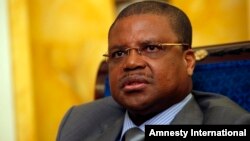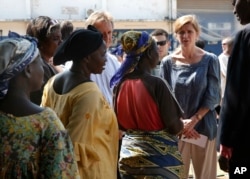The prime minister of the Central African Republic has announced plans to speed up a transition of power, as the country deals with deadly unrest.
Prime Minister Nicolas Tiangaye said the presidential election that originally was set for 2015 will take place next year instead.
He said a new national election authority will be sworn in by early next week.
There was no immediate comment from the CAR's interim president, Michel Djotodia.
The prime minister spoke to reporters on Thursday, after a meeting in the capital, Bangui, with U.S. ambassador to the U.N. Samantha Power.
Power, who is on a one-day visit to the CAR, told VOA that she is urging the country's leaders to work together.
"When people see division among the leaders, it sends a signal that the society is divided and so, they need to show unity," she said.
Power also said that those who have committed atrocities must be held accountable. "People have suffered in this country and if they don't feel as if their suffering and their pain is being taken into account, the risk is that they will seek to do justice themselves."
VOA correspondent Idrissa Fall, who is in Bangui, said gunfire could be heard in the capital, where a nighttime curfew is in effect. He said the source of the shooting was unclear.
The CAR slipped into chaos after mostly Muslim rebels, known as Seleka, toppled president Francois Bozize in March. Months of looting and killing have brought retaliation by Bozize allies and Christian militias known as anti-balaka.
Human rights groups expressed renewed alarm over the situation Thursday.
Amnesty International said more than 1,000 people had been killed in Bangui since violence flared earlier this month. The death toll is significantly higher than what had been reported by relief organizations.
Human Rights Watch issued a report saying the Christian militias have committed atrocities against Muslims in a cycle of violence that "threatens to spin out of control."
The group highlighted alleged brutality by the militias in Ouham province, where it said fighters have slit the throats of women and children.
Peter Bouckaert, emergencies director for Human Rights Watch, said there is a high potential for more mass violence.
"We documented many cases in which both Christians and Muslims were targeted because of their religion and their attackers made statements like, 'We will kill all the Muslims in the country.' We've documented where children as young as three years old had their throats cut by the attackers. So we're talking about extreme violence and communal violence. And once that communal violence sets in, it's very difficult to stop," said Bouckaert.
French and African Union troops in Bangui are attempting to stop the violence and restore order.
The African Union [AU] recently boosted the planned number of troops in an African-led support mission in CAR, known as MISCA, from about 3,600 to 6,000 troops.
The transfer of troop authority from the Economic Community of Central African States to MISCA is taking place on Thursday.
AU spokesman El Ghassim Wane said MISCA's leadership already has begun work in Bangui.
The White House said Thursday the U.S. is providing up to $101 million in assistance to CAR to help restore security.
Prime Minister Nicolas Tiangaye said the presidential election that originally was set for 2015 will take place next year instead.
He said a new national election authority will be sworn in by early next week.
There was no immediate comment from the CAR's interim president, Michel Djotodia.
The prime minister spoke to reporters on Thursday, after a meeting in the capital, Bangui, with U.S. ambassador to the U.N. Samantha Power.
Power, who is on a one-day visit to the CAR, told VOA that she is urging the country's leaders to work together.
"When people see division among the leaders, it sends a signal that the society is divided and so, they need to show unity," she said.
Power also said that those who have committed atrocities must be held accountable. "People have suffered in this country and if they don't feel as if their suffering and their pain is being taken into account, the risk is that they will seek to do justice themselves."
VOA correspondent Idrissa Fall, who is in Bangui, said gunfire could be heard in the capital, where a nighttime curfew is in effect. He said the source of the shooting was unclear.
The CAR slipped into chaos after mostly Muslim rebels, known as Seleka, toppled president Francois Bozize in March. Months of looting and killing have brought retaliation by Bozize allies and Christian militias known as anti-balaka.
Human rights groups expressed renewed alarm over the situation Thursday.
Amnesty International said more than 1,000 people had been killed in Bangui since violence flared earlier this month. The death toll is significantly higher than what had been reported by relief organizations.
Human Rights Watch issued a report saying the Christian militias have committed atrocities against Muslims in a cycle of violence that "threatens to spin out of control."
The group highlighted alleged brutality by the militias in Ouham province, where it said fighters have slit the throats of women and children.
Peter Bouckaert, emergencies director for Human Rights Watch, said there is a high potential for more mass violence.
"We documented many cases in which both Christians and Muslims were targeted because of their religion and their attackers made statements like, 'We will kill all the Muslims in the country.' We've documented where children as young as three years old had their throats cut by the attackers. So we're talking about extreme violence and communal violence. And once that communal violence sets in, it's very difficult to stop," said Bouckaert.
French and African Union troops in Bangui are attempting to stop the violence and restore order.
The African Union [AU] recently boosted the planned number of troops in an African-led support mission in CAR, known as MISCA, from about 3,600 to 6,000 troops.
The transfer of troop authority from the Economic Community of Central African States to MISCA is taking place on Thursday.
AU spokesman El Ghassim Wane said MISCA's leadership already has begun work in Bangui.
The White House said Thursday the U.S. is providing up to $101 million in assistance to CAR to help restore security.






